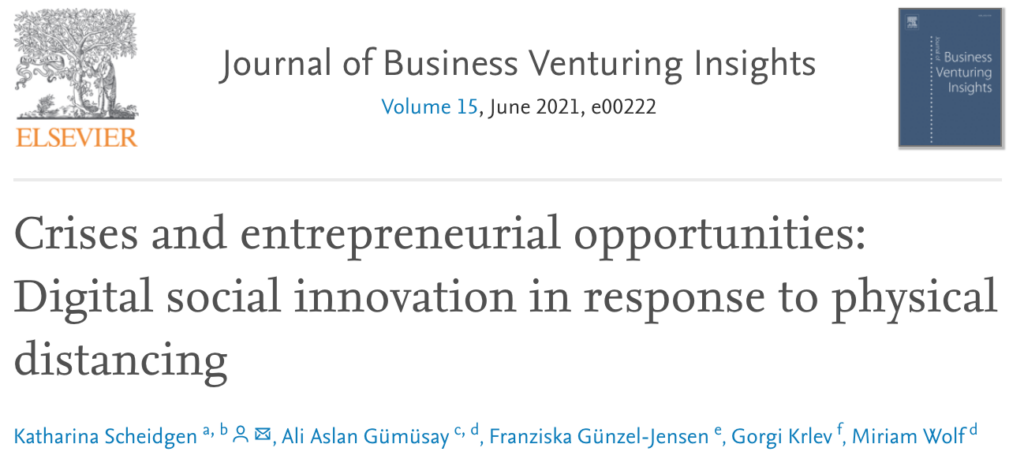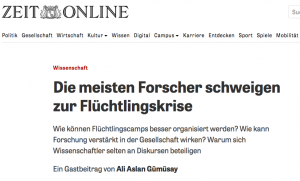Social entrepreneurship opens up a space for new ideas and creates opportunities to deal with conflict in innovative ways. Based on data from Afghanistan, Alina Spanuth and myself identify three ways social entrepreneurs work in conflict regions. The short piece in ![]() can be found here.
can be found here.
Digital Social Innovation
New co-authored article on digital social innovation and physical distancing.
Some highlights:
- Physical distancing constraints promote digital brokering and digitized services.
- New entrepreneurial actors engage in improvised venturing to create social innovation.
- Existing ventures engage in rapid pivoting and pro-social product extension.
- Social innovation in response to crisis can be ephemeral or enduring.
Abstract: As physical distancing is a core measure of containing the spread of COVID-19, this pandemic is a crisis that has uprooted social interaction. While current research mainly focuses on crises as a challenge for entrepreneurial ventures and potential regulatory response mechanisms, we complement this research by addressing the question of how crises in general—and COVID-19’s physical distancing measures in particular—shape entrepreneurial opportunities for social innovation. Based on two rounds of data collection—desktop research mapping out 95 entrepreneurial activities in Germany and four focus groups—we find first that entrepreneurs are proactive agents in alleviating the negative consequences of the COVID-19 crisis. They do so by creating two types of digital social innovation: digital brokering and digitized services. Second, we note that negative societal consequences of crises can be buffered by shifts in entrepreneurs’ strategic orientation through improvised venturing, rapid pivoting and pro-social product extension. Third, we note variance in the persistence of changes with consequences for entrepreneurial opportunities and social innovation: Whereas some social innovation are rather ephemeral, others might endure and promise long-term impacts. We offer key insights for the literature on crisis, social innovation and hybrid organizing as well as on the implications for entrepreneurship practice and policy.
Organization, Social Entrepreneurship & Innovation
Enjoyed teaching a seminar that conjoins research on organization, social entrepreneurship and innovation (OSEI) with methodologies to study these topics empirically. Sessions were divided into two parts. The first part engaged with research topic specifics such as organizing in and for society, leading social change, social innovation, social entrepreneurship, new forms of organizing and grand challenges, and scaling social change. It commenced with an overview into the theme followed by short student presentations of research articles and in-depth discussions about articles to unpack their implications, interrelationships and conceptual and practical consequences. The second part prepared students for their own work by focusing on research methodologies such as approaching cases, doing field research, and writing up research reports. The course thus bridged high quality global research and local empirical cases.
Some objectives:
- to familiarize students with some of the core concepts and theoretical underpinnings around organization, social entrepreneurship, and social innovation
- to help students gain a stronger understanding of, and think critically about, this domain, including its research requirements and methods for publishing scholarly research
- to use a format through which students can further develop the analytical, discursive and writing skills needed as a scholar
- to offer a forum for developing, refining, and presenting own research ideas
Course schedule:
|
No |
Date |
Topic |
| 1 | 14.10.2019 | Introduction |
| 2 | 28.10.2019 | Organizing in & for Society – Case Selection |
| 3 | 11.11.2019 | Leading Social Change – Methodological Considerations |
| 4 | 25.11.2019 | Social Innovation & Entrepreneurship – Field Research |
| 5 | 09.12.2019 | New Forms of Organizing & Grand Challenges – Research Dynamics |
| 6 | 06.01.2020 | Scaling Social Change – Writing up Research Reports |
| 7 | 20.01.2020 | Re-view & out-look |
Sustainable Development Goals & Academia
I gave an interview (in German) on researching new forms of organizing such as social entrepreneurial ventures, incubators & discourse spaces and how these tackle grand challenges. The interview also includes some reflections on the Zahnräder Network:
17 Ziele in der Wissenschaft: Neue Räume für neues Denken
Armut, Hunger, Klimawandel – ohne Frage große Herausforderungen unserer Zeit. Wie innovative Organisationsformen diese Themen angehen, dazu forscht Dr. Ali Aslan Gümüsay an der Universität Hamburg. Seit 2018 leitet er das von der Deutschen Forschungsgesellschaft geförderte Netzwerk „Grand Challenges & New Forms of Organizing“. Er ist Mitgründer des Zahnräder Netzwerks und lebt mit seiner Familie in Hamburg. Ein Gespräch über große Herausforderungen, wissenschaftliche Leidenschaft und persönliches Engagement.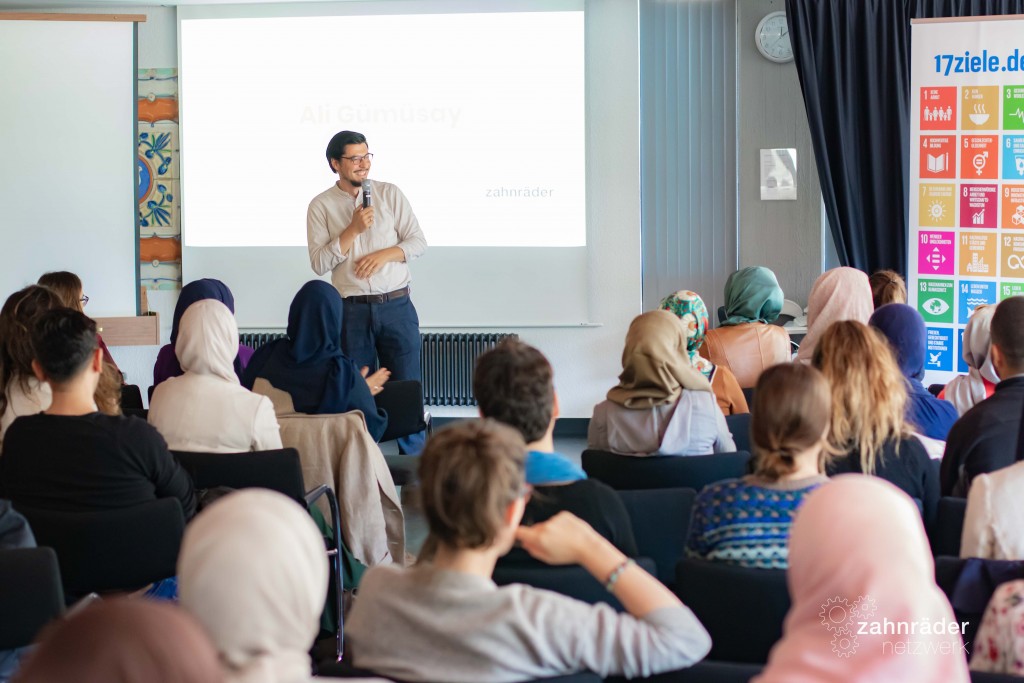
Unpacking entrepreneurial opportunities
The paper “Unpacking entrepreneurial opportunities: an institutional logics perspective” has just been published in Innovation: Organization & Management. The article can be found here.
Abstract: Taking into account the institutional context, I refine and broaden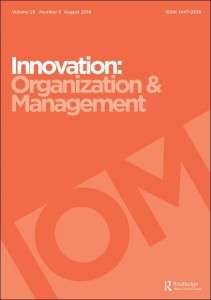 the concept of entrepreneurial opportunities by introducing micro-level evaluative criteria based on underlying macro-level institutional logics. The existing focus on so-called lucrative opportunities, which is implicitly based on a market logic, narrows the overall actual set of potential opportunities, and neglects what I call the opportunity–entrepreneur desirability nexus. Enterprising individuals evaluate and pursue entrepreneurial opportunities based on various and frequently combined underlying institutional logics. The extensive institutional theory literature on managing diverse and sometimes contradictory institutional demands, for instance in the pursuit of hybrid ventures, thus offers theoretical insights that are appropriate and expedient for the analysis and theoretical advancement of the entrepreneurial opportunity notion.
the concept of entrepreneurial opportunities by introducing micro-level evaluative criteria based on underlying macro-level institutional logics. The existing focus on so-called lucrative opportunities, which is implicitly based on a market logic, narrows the overall actual set of potential opportunities, and neglects what I call the opportunity–entrepreneur desirability nexus. Enterprising individuals evaluate and pursue entrepreneurial opportunities based on various and frequently combined underlying institutional logics. The extensive institutional theory literature on managing diverse and sometimes contradictory institutional demands, for instance in the pursuit of hybrid ventures, thus offers theoretical insights that are appropriate and expedient for the analysis and theoretical advancement of the entrepreneurial opportunity notion.
2 Gastbeiträge zur Flüchtlingskrise
Die meisten Forscher schweigen zur Flüchtlingskrise
Wie können Flüchtlingscamps besser organisiert werden? Wie kann Forschung verstärkt in der Gesellschaft wirken? Warum sich Wissenschaftler selten an Diskursen beteiligen. Artikel hier.
Eine Chance für Deutschland
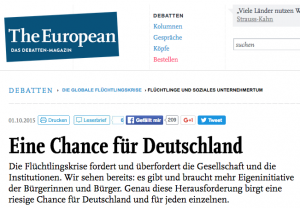 Die Flüchtlingskrise fordert und überfordert die Gesellschaft und die Institutionen. Wir sehen bereits: es gibt und braucht mehr Eigeninitiative der Bürgerinnen und Bürger. Genau diese Herausforderung birgt eine riesige Chance für Deutschland und für jeden einzelnen. Artikel hier.
Die Flüchtlingskrise fordert und überfordert die Gesellschaft und die Institutionen. Wir sehen bereits: es gibt und braucht mehr Eigeninitiative der Bürgerinnen und Bürger. Genau diese Herausforderung birgt eine riesige Chance für Deutschland und für jeden einzelnen. Artikel hier.
Entrepreneurship from an Islamic Perspective
Article published in Journal of Business Ethics (2015), 130(1): pp. 199-208.
Abstract
Research about the role of religion in entrepreneurship and more broadly management is sparse. In this conceptual article we complement existing entrepreneurship theory by examining entrepreneurship from an Islamic perspective (EIP).
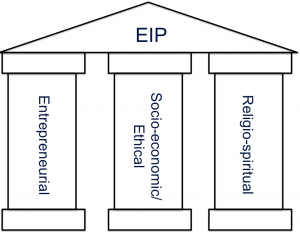
EIP is based on three interconnected pillars: the entrepreneurial, socio-economic/ethical and religio-spiritual. We outline how Islam shapes entrepreneurship at the micro-, meso- and macro-level, indicate how Islam may be considered an entrepreneurial religion in the sense that it enables and encourages entrepreneurial activity, review research streams interlinking Islam with entrepreneurship and management and outline promising research approaches.
Further information here.
Update: An interview here.
Buchkapitel: Das Zahnräder Netzwerk
Darum geht’s: Intern wie extern möchten wir einander „bewegen“ – innovativ, kreativ, professionell: ein Netzwerk von sozialen Unternehmern. Zahnräder sind die unersättlich leidenschaftlichen Menschen, die sich mit Körper, Herz und Verstand vollends der nachhaltigen gesellschaftlichen Veränderung widmen.
Das komplette Buchkapitel zum Zahnräder Netzwerk ist im “Handbuch Christentum und Islam in Deutschland” erschienen und kann hier herunter geladen werden. Geschrieben habe ich das Kapitel letztes Jahr als Vorsitzender. Seit Dezember 2013 bin ich Beiratsvorsitzender.

Zahnräder ist ein Inkubator für soziales Unternehmertum. Unser Inkubator ist ein größtenteils virtuelles Gründer- und Innovationszentrum. Soziales Unternehmertum bzw. Social Entrepreneurship befasst sich mit innovativen, meist markt-orientierten Lösungsansätzen, verknüpft mit einer Leidenschaft für ökologische und soziale Nachhaltigkeit.
Soziales Unternehmertum im Zahnräder Netzwerk beruht auf den drei Säulen: Wert, Werte und spirituelle Weiterentwicklung (mehr zu Entrepreneurship from an Islamic Perspective hier). Wir streben nach ökonomischer, ökologisch-sozialer und spiritueller Nachhaltigkeit. Wir unterstützen die muslimischen Engagierten bei der Verwirklichung ihrer vielfältigsten Projekte – von der Idee über die Umsetzung bis hin zum gereiften Ergebnis. Getreu dem Motto: von Muslimen für die Gesellschaft. Für mehr Teilnahme und Teilhabe an unserer Gesellschaft.
Die bibliografischen Angaben für das Kapitel: Gümüsay, Ali Aslan, Das “Zahnräder Netzwerk”, in: Handbuch Christentum und Islam in Deutschland. Grundlagen, Erfahrungen und Perspektive des Zusammenlebens, im Auftrag der Eugen-Biser-Stiftung hg. von Mathias Rohe, Havva Engin, Mouhanad Khorchide, Ömer Özsoy, Hansjörg Schmid, Freiburg i. Br., Herder 2014, S. 1236-1245.
Productive Innovation
Blogpost first published at the Skoll Centre for Social Entrepreneurship Website.
Making science useful
Academia is far too often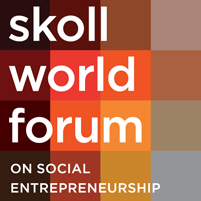 removed from practice. Thousands of books and articles are written about innovation and practitioners feel inclined to ask: so what? Johanna Mair, Professor of Organization, Management and Leadership at the Hertie School of Governance and Academic Editor of the Stanford Social Innovation Review and Christian Seelos, a visiting scholar at the Stanford University Center on Philanthropy and Civil Society who previously directed the IESE Platform for Strategy and Sustainability, feel and understand this frustration. In a session on the balancing act of innovation and scale at the Skoll World Forum they engage with the audience as a step towards bridging these diverging worlds: by intervening more productively in the world in a scholarly way.
removed from practice. Thousands of books and articles are written about innovation and practitioners feel inclined to ask: so what? Johanna Mair, Professor of Organization, Management and Leadership at the Hertie School of Governance and Academic Editor of the Stanford Social Innovation Review and Christian Seelos, a visiting scholar at the Stanford University Center on Philanthropy and Civil Society who previously directed the IESE Platform for Strategy and Sustainability, feel and understand this frustration. In a session on the balancing act of innovation and scale at the Skoll World Forum they engage with the audience as a step towards bridging these diverging worlds: by intervening more productively in the world in a scholarly way.
From innovation as an ideology to innovation as a process
Much scholarly attention concentrates on the creation of social ventures neglecting established organizations and the question of how to innovate continuously. Mair and Seelos stress that innovation needs to be seen as a process, not an ideology: “Innovation is not the holy grail.” We often overrate the value of innovation, undervalue the importance of failed innovation and underappreciate the difficulty of innovation. Innovation is a complex process and a long and continuous development from idea over evaluation to experimentation. Along the way organizations face many pitfalls. Ideas often never get started; or end too early. Reasons are, for example, a strong target focus, power struggles, fearing punishment and potential failures, a homogenous workforce and too much distance of managers from the frontline.
Productive innovation
Andrew, a Skoll World Forum attendee, comments: “The ideas are there, but opportunities are not.” Many heads nod. The remark hits one of the core problems that Mair and Seelos convey: Organisations need innovation routines and processes. Ideas are normally not enacted by individuals. They require groups and both formal and informal engagement. Innovation consists of idea generation, evaluation, experimentation and enactment. Within this difficult and complex process, organisations should artistically balance innovation and scale by exploiting past and targeting future innovations given the availability of resources – in a process of productive innovation.
Zahnräder Netzwerk – ein Update
Zahnräder ist eine Plattform für soziale Innovation. Wir helfen bei der Verwirklichung von den unterschiedlichsten Projekten – von der Idee über die Umsetzung bis zum gereiften Ergebnis. Wir fördern Soziales Unternehmertum, also Social Entrepreneurship, getreu dem Motto: von Muslimen für die Gesellschaft. Für mehr Teilnahme & Teilhabe an unserer Gesellschaft.
Zahnräder extern: Konferenz
Die nächste Konferenz findet im April in Heidelberg statt – man kann sich noch hier anmelden. Gewinner aus den letzten Jahren waren u.a. CubeMag, Hima, i,slam, Muhammadhoeren, Muslime.TV und StudyCoach 2.0. Wir bieten Ideen und Projekten Motivation, Wissen, Kontakte und finanzielle Unterstützung an (die vier Formen von Kapital in der Tabelle unten). Einige Projekte konnten durch das Preisgeld umgesetzt werden, andere Projekte brauchten noch einen Schuss Motivation oder Projektwissen, um den nächsten Schritt einzuleiten. Oft kamen auch Personen mit ähnlichen Ideen zusammen und haben sich daran gemacht, diese dann deutschlandweit umzusetzen. Aus zwei lokalen Ideen wurde so ein wirkliches und wirkendes bundesweites Projekt, das Deutschland mitbewegt. Dieses Jahr wird es übrigens Preisgelder von über 3000 Euro geben.
Und tolle ZahnräderX-Veranstaltungen bieten Zahnräder lokal an, z.B. in Berlin und NRW– vor der Haustür sozusagen.
| Ability | Usability | |
| Internal | Human Capital | Cultural & Motivational Capital |
| External | Social Capital | Financial Capital |
Zahnräder-Historie
Darum geht’s: Intern wie extern möchten wir einander „bewegen“ – innovativ, kreativ, professionell: ein Netzwerk muslimischer Entrepreneure. Zahnräder begann im März 2010 vor knapp 3 Jahren mit diesem Wunsch nach Bewegung. Nach einem ersten dreiköpfigen Treffen im März in Oxford waren wir im Mai bereits 7 – 7 Gründer. Und wie auch heute in vielen Teams haben wir uns lange Zeit nicht gesehen, sondern nur via Skype kommuniziert. 3 Jahre später sind wir knapp 100 Mitwirkende.
Unsere Partner
Wir haben vielfältige Partner: Jugend für Europa, British Council, das AKE Bildungswerk, die Sawasya Stiftung, der VdM und Ashoka Changemakers sind einige unserer Unterstützer. Letztes Jahr haben wir darüber hinaus den die Social Entrepreneurship Akademie Act for Impact Publikumspreis im Wert von 5000 Euro gewonnen. Zahnräder sagte: Danke.
Zahnräder intern: Institutionalisierter Weiterbildungsprozess
Zahnräder besteht aus einem Zwei-Säulen-Modell. Extern untersützen wir bei der Verwirklichung von Projekten. Intern bieten wir die Möglichkeit, einen Lern- und Mitwirkungsprozess zu durchlaufen und so nicht nur die Gesellschaft sondern auch sich nachhaltig zu prägen: vom Teammitglied, über die Teamleitung bis hin zum Kernteam.
Wir sind dabei matrixartig organisiert und jedes Zahnrad kann mehrere Bereiche durchlaufen. Unsere Projektgruppen sind die Konferenzorganisation, ZahnräderX und der Think Tank. Unsere funktionalen Gruppen sind IT, Presse, Personalwesen und Finanzen. Jedes Jahr planen wir diese Gruppen um einen Strang zu erweitern bzw. diese Gruppen auszubauen.
Quo vadis?
Wir werden den Entwicklungsprozess verstärkt institutionalisieren. Zahnräder durchlaufen unterschiedliche Stadien: vom Recruiting über Weiterbildung bis zum Exit und Alumni-Status. Wir suchen Menschen, die etwas bewegen möchten und wir bewegen sie. Das Recruiting bietet neuen Zahnrädern eine Aufnahme und Einstieg in die Organisation von Zahnräder. Weiterbildungsbausteine verknüpfen Theorie mit Praxis. Module können z.B. sein Digital Work, Corporate Identity, E-Teams, Leadership, Religion & Wirtschaft, Islamisches Entrepreneurship, Vision & Innovation.
Geplant ist eine Internationalsierung der Tätigkeiten. Dieses Jahr konzentrieren wir uns auf den deutschsprachigen Raum. So findet unsere Konferenz dieses Mal auch weiter südlich statt, um so die Anfahrt aus der Schweiz und aus Österreich zu erleichtern. In einigen Jahren könnten dann Kooperationen und Partnerschaften entstehen, die verstärkt europäisch und global sind. Mit unserem Unterstützer Jugend für Europa sind wir hierbei einen wichtigen ersten Schritt gegangen.
Wir möchten ein professioneller Ansprechpartner für die Umsetzung von Projekten jeglicher Stufe sein: Von vor der Idee bis hin zur Reflektion. Zahnräder hat noch einen langen Weg vor sich. Wir suchen hierfür nach Weggefährten. Wer Interesse hat, kann sich bei uns melden. Unsere Broschüre bietet eine kompakte Übersicht.
Ansprechpartner:
- Wer an der Konferenz teilnehmen möchte: konferenz2013@zahnraeder-netzwerk.de
- Wer bei Zahnräder mitwirken möchte: hr@zahnraeder-netzwerk.de
- Wer uns unterstützen möchte: finanzen@zahnraeder-netzwerk.de
Wir werden weiter versuchen intern wie extern nachhaltigen Wandel zu kreieren und so leidenschaftlich unseren Beitrag zu einem positiven Wandel in unserer Gesellschaft zu leisten.
